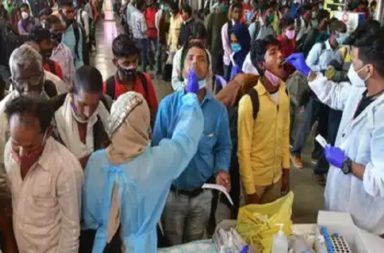Despite achieving a record recovery rate against the novel coronavirus, a large proportion of Indian population still remains vulnerable to it, the third serosurvey conducted by the Indian Council of Medical Research (ICMR) has revealed. Sharing the findings of the survey at a press conference, the Union Health Ministry said the third national serosurvey has found that 21.5 per cent of the population, surveyed from December 17 to January 8, showed evidence of past exposure to the coronavirus. A large population still remains vulnerable and vaccination is necessary, the ministry said.
Presenting the findings of the survey, ICMR Director-General Dr Balram Bhargava said 21.4 per cent of the 28,589 people, aged 18 years and above, surveyed during the period showed evidence of past exposure to the coronavirus infection. While 25.3 per cent of children aged 10 to 17 years from the same number of surveyed population have had the disease, he said. Urban slums (31.7 per cent) and urban non-slums (26.2 per cent) had a higher SARS-CoV-2 prevalence than that in rural areas (19.1 per cent), Bhargava said, adding that 23.4 per cent of individuals above 60 years of age had suffered from COVID-19.
There were more women (22.7%) as compared to men (20.3%) who were found to have antibodies against the Covid-19 virus, the results say. The survey was conducted in the same 700 villages or wards in 70 districts in 21 states selected during the first and second rounds of the national survey, to study the epidemic’s growth longitudinally over months.
So far, 49,93,427 beneficiaries have been vaccinated in the country out of which 11 states and Union Territories, including Tamil Nadu, Assam, Ladakh, Chandigarh, Meghalaya and Manipur, have covered 30 per cent or fewer healthcare workers through the COVID-19 vaccination, it said.





